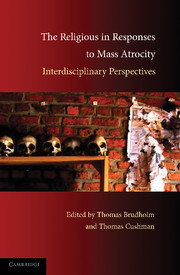Book contents
- Frontmatter
- Contents
- List of Contributors
- Acknowledgments
- Introduction: The Religious in Responses to Mass Atrocity
- Part I Between Necessity and Impossibility: The Role of Religion in the Face of Atrocity
- Part II Does It Help to Import Religious Ideas: Reflections on Punishment, War, and Forgiveness
- Part III Sociologies of the Religious in Responses to Mass Atrocities
- 7 Making Whole: The Ethics and Politics of “Coming to Terms with the Past”
- 8 When Faith Meets History: The Influence of Religion on Transitional Justice
- 9 Genocidal Rupture and Performative Repair in Global Civil Society: Reconsidering the Discourse of Apology in the Face of Mass Atrocity
- 10 Violence, Human Rights, and Piety: Cosmopolitanism versus Virtuous Exclusion in Response to Atrocity
- Index
7 - Making Whole: The Ethics and Politics of “Coming to Terms with the Past”
Published online by Cambridge University Press: 01 September 2009
- Frontmatter
- Contents
- List of Contributors
- Acknowledgments
- Introduction: The Religious in Responses to Mass Atrocity
- Part I Between Necessity and Impossibility: The Role of Religion in the Face of Atrocity
- Part II Does It Help to Import Religious Ideas: Reflections on Punishment, War, and Forgiveness
- Part III Sociologies of the Religious in Responses to Mass Atrocities
- 7 Making Whole: The Ethics and Politics of “Coming to Terms with the Past”
- 8 When Faith Meets History: The Influence of Religion on Transitional Justice
- 9 Genocidal Rupture and Performative Repair in Global Civil Society: Reconsidering the Discourse of Apology in the Face of Mass Atrocity
- 10 Violence, Human Rights, and Piety: Cosmopolitanism versus Virtuous Exclusion in Response to Atrocity
- Index
Summary
The idea of reconstruction, of “making whole what has been smashed,” is a powerful one in contemporary culture. So is the phrase which has acquired the character of a mantra for those seeking to deal with social problems seen as rooted in history: namely, the idea of “coming to terms with the past.” In this phrase, the past is regarded not so much as a “foreign country,” but as an alienated part of ourselves – a part cut off from us yet confronting us as an alien being and continuing to do us harm despite being “over.” The parallels in this figure of thought with Marx's notion of commodity fetishism are hard to miss; for Marx, despite their human origins, the world of man-made objects had taken up a position “over against” man, dominating the present as congealed past exertion and as the bastard progeny of an inhumane economic order. The past is widely seen in similar terms today – a Pandora's box of unresolved wrongs that cause persistent troubles for the living.
This chapter explores the contemporary concern to come to terms with the past at two levels – first, through a more general and philosophical discussion of efforts in the past century or so to address the meaning of the past for the present and, second, via a discussion of the political and ethico-religious motifs associated with coming to terms with the legacy of slavery in the United States.
- Type
- Chapter
- Information
- The Religious in Responses to Mass AtrocityInterdisciplinary Perspectives, pp. 157 - 173Publisher: Cambridge University PressPrint publication year: 2009

